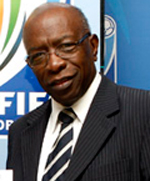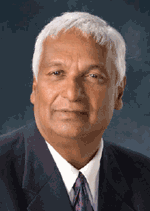AS THE agony of an environmentalist’s hunger strike—to death if necessary—spreads across Trinidad and Tobago, segments of a “partnership” administration in Port-of-Spain seem to be multiplying their political blunders in response to the stressful challenges arising from what’s an unequal development in governance of that Caribbean Community state.
Within the second week of Dr Wayne Kublalsingh’s hunger-strike protest to influence a reversal of the decision by the People’s Partnership Government of Prime Minister
 |
 |
 |
 |
Kamla Persad-Bissessar to proceed with the Solomon Hochoy Highway extension project, senior counsel, Dana Seetahal, also an ‘Express’ columnist, had warned that he could face a criminal charge for “attempted suicide”.
By last week, while cabinet ministers, and notably National Security Minister Jack Warner, were uncharitably mocking the environmentalist’s extreme form of protest, Seetahal thought it necessary to debunk “unacceptable rum-shop talk” by those who ought to know better.
A different scenario of “warnings” involved also the National Infrastructure Development Company Ltd (Nidco), which pointed to the report of a technical review committee that has fully endorsed the highway project. It also appealed to Kublalsingh to terminate his hunger strike protest with an unmistakable message that the TT$7 billion highway project was decidedly in the national interest.
Ministerial conflicts
In between, Foreign Affairs Minister Winston Dookeran, original founder-leader of Congress of the People (COP) came forward with a most surprising intervention with a public statement, while on government business in The Dominican Republic, urging the Prime Minister to “show compassion” for Kublalsingh by striking a “compromise.”
The position adopted by Dookeran, normally reticent in becoming publicly involved in controversies as a senior government minister, would have startled not just the people of Trinidad and Tobago–among them supporters and opponents of Kublalsingh—but other citizens of Caricom via media reporting’s.
For one thing Dookeran, an experienced politician and technocrat, is yet to explain why he chose such a public route—however well-intentioned—in preference for a private appeal, via written note or telephone conversation with the Prime Minister. He was to be subsequently rebuked by the PPG’s flamboyant Chief Whip in the House of Representatives, Dr Roodal Monilall, with his known penchant for controversies of his own making.
Against the backdrop of Minister Warner’s infantile political talk to the media of Kublalsingh being a “con man” by fasting in public during the day and carefully eating at certain ‘safe houses’ at night, Prime Minister Persad-Bissessar was left to defend her own statement against unnamed PPG’s dissenters who she has warned against being “chewed and spit out” by the electorate when the bell rings for new local and national elections.
PM on defensive
Interestingly, she went on the defensive, when questioned by the media, that she had implicitly included Dookeran, among the dissenting coalition partners, of “betrayal of trust.” No such mood surfaced from Jack Warner, chairman of the government’s dominant coalition partner, United National Congress. For Warner, Dookeran has shown “disloyalty” at a crucial phase.
While the war-of-words politicking was being played out among government and opposition politicians and their allies located in other places, the protesting environmentalist, increasingly revealing a worrying frail, physique, continued to demonstrate a resolute capacity to maintain his hunger strike–even as doctors were beginning to ring the alarm bell.
However, by the weekend, as the Prime Minister maintained her government’s firm resolve to press ahead with the highway project and the President of the National Infrastructure Development Company, Dr Carson Charles, was reaffirming that there was “no need” for a further study to avoid the threatened environmental destruction envisaged by Kublalsingh’s “Highway Re-route Movement” (HRM).
Having been presented with a copy of a draft agreement reached on Monday between a Joint Consulative Council (JCC), that includes Nidco, and Ministry of Works, Kublalsingh told the media he would read it and convey his position by yesterday (Tues)—the 20th day of his hunger strike.
To judge from his mood, according to media reports, Kublalsingh did not give much hope for ending his unprecedented (for T&T) form of peaceful hunger-strike protest, though he confessed to “feeling very weak, extremely weak…”
Undoubtedly he prides himself as a martyr with a cause. But even some of his admirers and sympathisers have doubts about his resolve, conscious as they are of objective scientific and management arguments that were also advanced, well ahead of the Highway Re-route Movement the environmentalist had spawned by a commitment not easy to replicate.
Amid the more recent dread warning signals from doctors, it is to be hoped that the protesting environmentalist survives the self-imposed punishment to his body, having more than jolted a government and nation for focused vigilance against destruction of the environment while pursuing laudable and quite costly infrastructure projects in the national interest.



.jpg)








